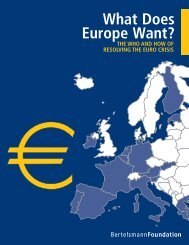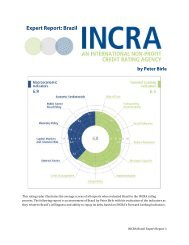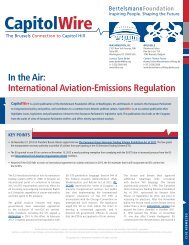MEMO ONTURKEYThe State of PlayTurkey finds itself in a paradoxicalposition. It has been a loyal ally of theWest and has been a member of NATOsince 1952—but its population widelydistrusts the US and Europe. Despiteknocking on the EU’s door for decades,it does not recognize the Republic ofCyprus’s ethnic-Greek government andmaintains uneasy relations with Greece,France and other EU members. Despiteits ambitions to become an influentialand mediating power in the MiddleEast, Turkey appears at odds with anincreasing number of its neighbors.These difficulties, however, have notprevented Turkey from being regardedas a key partner by the US and manyEuropean countries.The paradox extends to Turkey’s domesticsituation. After the “lost decade” of the1990s and the February 2001 bankingcrisis, the government initiated, with thehelp of a large IMF program, key reformsin 2002: restructuring the commercialbanks, providing autonomy to thecentral bank and removing restrictionson foreign direct investment. Thesereforms, endorsed by the Justice andDevelopment Party (AKP) and PrimeMinister Recep Tayyip Erdogan whenthey came to power in 2003, provided adramatic boost to the Turkish economy. 1Yet the recent downturn—GDP only grewat an annual rate of 2.9 percent in thesecond quarter of this year as opposed tomore than 8 percent in the previous twoyears—has spotlighted Turkey’s longtermstructural weaknesses. 2 Thoughit decreased this year, the currentaccount deficit remains high, makingthe country vulnerable to fluctuations inforeign investment, high inflation, and astruggling education system not suitedfor an advanced economy. 3 Furthermore,future economic prospects are tiedThe stalled process of Turkish political reform has alsocaused apprehension in the US and Europe.to geopolitical developments beyondTurkey’s control.The stalled process of Turkish politicalreform has also caused apprehension inthe US and Europe. Driven by its desireto join the EU, the AKP made a promisingstart by reducing the powers of the 1991anti-terror laws, abolishing restrictionson the freedom of speech and thepress, and taking steps to end the costlyarmed struggle with Kurdish insurgents.Aside from secret negotiations with theKurdistan Workers’ Party (PKK) in 2005,Erdogan initiated conciliatory gesturessuch as relaxing the ban on Kurdishlanguage-education and launching astate-run Kurdish-language TV station. 4However, prospects for democraticreforms, human rights and a peacefulsolution to the Kurdish question havesuffered important setbacks. The conflictwith the PKK has escalated in recentmonths, and journalists, writers andKurdish political activists have beenjailed and prosecuted, undermining civilliberties. 5 Relations between the AKP andthe military are another major sourceof concern. Initially, the Turkish publicwelcomed Erdogan’s successful effortsto curtail the military’s power. It alsoinitially supported two legal proceedingsagainst senior officers accused ofplotting to overthrow the government—the Sledgehammer trials and the caseagainst the alleged ultranationalistclandestine organization Ergenekon. Yetmany ordinary Turks have now becomedisenchanted by these proceedings.In particular, the vast and continuousexpansion of the Ergenekon case toinclude many government opponentshas strengthened the impression thatthe AKP is more interested in settlingscores than achieving justice, and thedragging on of these cases has onlyadded to the climate of uncertainty. 6Turkey’s foreign policy under the AKPhas followed a very similar pattern toits domestic policy: an initial burst ofpromising changes followed by reversals.The first series of domestic reformsenacted by Erdogan’s governmenthelped to finally open membershipnegotiations with the EU in 2005, 18years after Turkey had officially appliedfor membership. But the negotiationssoon stalled, a victim of the slowdown inTurkey’s democratization process and thestubborn opposition of certain memberstates (especially Greece, Cyprus,Germany, France and Austria). The talks’current prospects are hardly cause foroptimism: in July 2012, Turkey froze itsties with the rotating EU presidencyheld by Cyprus, and only 13 of the 35negotiation chapters have been openedso far. 7 The latest annual EU report onTurkey’s candidacy had a scathing tone,highlighting “recurring infringements”of liberty, security, fair trial rights andfreedom of expression. 8Turkey has also sought to translate itsrising economic power into greaterdiplomatic influence in the Middle East,underpinned by the goal of ensuring“zero problems with its neighbors”.However, for all its good intentions,Turkey’s more assertive approach hasfailed to avoid disputes with its MiddleEastern neighbors—problems that inmany cases could directly affect theUS and Europe. Turkey’s longstandingpolicy partnership with Israel took a5 6Turkey
in percentTurkey’s Annual GNI Growth & Inflation Rate (2000-2011)6050403020100-102000 2001 2002 2003 2004 2005 2006 2007 2008 2009 2010 2011Gross National IncomeGrowth (annual)serious turn for the worse after the2008–2009 Israeli-Gaza conflict and theMay 2010 Israeli raid on an aid flotillaheaded from Turkey for the Gaza Strip.After the release of a UN report on theflotilla incident in September 2011,Turkey downgraded diplomatic tieswith Israel and suspended militarycooperation. Reconciliation would be agreat diplomatic asset for Europe andthe US, but remains blocked by Turkey’sdemands for an apology from Israel,compensation for the victims of theraid, and an end to the Israeli blockadeof Gaza.Turkey’s attempted rapprochement withIran presented another problem for theUS and Europe. Under the AKP, Ankaratook steps to patch up its historicallytense relations with Tehran, significantlyincreasing bilateral trade (from $1.25billion in 2002 to $16.05 billion in2011). 9 Even more controversial, Turkey’sattempts to mediate the ongoing Iraniannuclear crisis undermined the delicateglobal consensus that the US andEurope were trying to build on sanctions.Along with Brazil, Turkey signed a deal inMay 2010 to outsource Iran’s enricheduranium in exchange for fuel, and votedthe following month against a newround of UN sanctions against Tehran.Source: World BankInflation, ConsumerPrices (annual)This rapprochement has, however,lost momentum since 2011, draggeddown by the countries’ differences overthe Arab uprising, Turkish support forNATO’s missile defense and Syria. 10This could provide an opportunity formore meaningful collaboration betweenTurkey and the West insofar as managingthe Iranian nuclear crisis. 11...for all its goodintentions, Turkey’smore assertive approachhas failed to avoid disputeswith its Middle Easternneighbors—problemsthat in many casescould directly affect theUS and Europe.Finally, the AKP had also tried in pastyears to mend fences with Syria, whichhad long opposed Turkey’s close ties withthe West. Until 2008, Turkey attemptedto mediate the conflict between Israeland Syria and, in the early stages of theSyrian civil war, maintained relationswith Syrian President Bashar al-Assad,pleading with him to stop the violenceand begin reforms. But relations betweenDamascus and Ankara soon plummetedas the war escalated. 12 After August 2011,Turkey cut ties to Assad and began toprovide aid to the opposition. In June2012, Syria shot down a Turkish fighterjet, and both sides exchanged mortarfire along their border in October 2012,bringing them dangerously close toopen war. Such a conflict would not bewelcomed by a Turkish public opposedto intervention in Syria; it would bedisastrous for the region, and could alsodraw in Europe and the US, consideringTurkey’s NATO membership. 13European PerspectivesEurope’s relationship with Turkeyremains complex and multi-faceted.Individual EU members have over thepast seven years sought to managetheir bilateral relationships withAnkara while outlining a position onTurkey’s EU candidacy. The issue hasdeeply polarized the union, pittingfirm supporters (Spain, Sweden andthe UK among them) against stubbornopponents (particularly, as mentioned,France, Germany and Cyprus). Since theopening of negotiations in 2005, Ankarahas had to address EU concerns onTurkey’s size and potential power withinthe union, the ongoing Cyprus issue,and the social and political ramificationsof admitting the EU’s first predominantlyMuslim country. Through all this, theTurkish government has experienceddiverging relations with Europe’spower brokers.Turkey has found a British governmenteager to expand on already warmrelations. The UK has sought to deepenties as part of a broader strategy aimedat fostering closer partnerships withemerging economic powers. In 2010,Turkey was the UK’s 22nd largest exportmarket, while the UK was Turkey’s 12thlargest source of imports. 14 Bilateraltrade averages £6.5 billion per year, afigure the British government aims todouble by 2015. 15 It has also pursued anumber of bilateral initiatives aimed atimproving economic cooperation, suchas the UK-Turkey CEO Forum. 16Geopolitically, the UK views TurkeyTurkey5 7
- Page 3:
Field Manual to EuropeIntroduction
- Page 6: multilateral channels. Europeanshav
- Page 9 and 10: JuneBritish presidency of UNSCJune
- Page 12 and 13: US-EU Investment vs. Global Nationa
- Page 14 and 15: economic conditions in the eurozone
- Page 17 and 18: MEMO ONTHE EUROZONE CRISISThe State
- Page 19 and 20: attitude toward moral hazard. Withw
- Page 21 and 22: Greece: 2010 Bailout BreakdownGreec
- Page 23 and 24: the deficit from 4.5 percent to thr
- Page 27 and 28: NATO thus faces an uncertain future
- Page 29 and 30: 1. Consider NATO’s defensespendin
- Page 31 and 32: of-area operations and worldwidepar
- Page 33 and 34: concurrent terrorist attack in Beng
- Page 35: 2. Strengthen regionalpartnerships
- Page 38 and 39: MEMO ONCOUNTERTERRORISM ANDHOMELAND
- Page 40 and 41: home affairs (JHA), particularly in
- Page 43 and 44: Status of EU Countries in the US Vi
- Page 45 and 46: offensive capability centered at NA
- Page 47 and 48: socialized, i.e. there is a tacit e
- Page 49 and 50: such technology, such as deep packe
- Page 51 and 52: MEMO ONENERGY & CLIMATE CHANGEThe S
- Page 54 and 55: identifying the agents most qualifi
- Page 58 and 59: as a rising regional and internatio
- Page 60 and 61: CASE STUDY: TURKEY’S ENERGY ROLE:
- Page 62 and 63: 22%12%Turkey’s Main Trading Partn
- Page 64 and 65: MEMO ONRUSSIAThe State of PlayIn Pr
- Page 66 and 67: EU-Russia security apparatus. Themo
- Page 68 and 69: greater market access for US busine
- Page 70 and 71: MEMO ONCHINAThe State of PlayIn 201
- Page 72 and 73: But China’s competitive meridian
- Page 74 and 75: in millions of USDUS-China Bilatera
- Page 76 and 77: 7 6Acknowledgements
- Page 78 and 79: CITATIONSINTRODUCTION1See “Confid
- Page 80 and 81: 20Castle, S. (17 September, 2011).
- Page 82 and 83: ARAB UPRISING1Koch, C. (summer 2011
- Page 84 and 85: COUNTERTERRORISM & HOMELAND SECURIT
- Page 86 and 87: 21Healey, J. (January 2012). Beyond
- Page 88 and 89: 20Berlemont, I. (25 July, 2012). Fr
- Page 90 and 91: 24Putin, V. (6 September, 2012). An
- Page 92: Bertelsmann Foundation1101 New York






